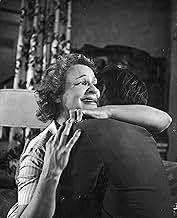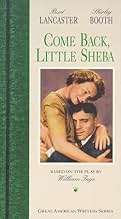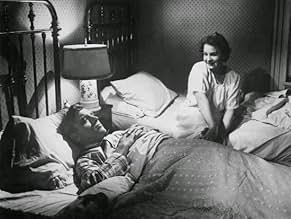IMDb रेटिंग
7.5/10
5.6 हज़ार
आपकी रेटिंग
अपनी भाषा में प्लॉट जोड़ेंAn emotionally remote recovering alcoholic and his dowdy, unambitious wife face a personal crisis when they take in an attractive lodger.An emotionally remote recovering alcoholic and his dowdy, unambitious wife face a personal crisis when they take in an attractive lodger.An emotionally remote recovering alcoholic and his dowdy, unambitious wife face a personal crisis when they take in an attractive lodger.
- 1 ऑस्कर जीते
- 7 जीत और कुल 8 नामांकन
Robert Fuller
- Extra
- (बिना क्रेडिट के)
Ned Glass
- Man at AA Meeting
- (बिना क्रेडिट के)
William Haade
- Hospital Intern
- (बिना क्रेडिट के)
Virginia Hall
- Blonde in Diner
- (बिना क्रेडिट के)
Anthony Jochim
- Mr. Cruthers
- (बिना क्रेडिट के)
Peter Leeds
- Milkman
- (बिना क्रेडिट के)
Kitty McHugh
- Pearl Stinson - AA Member
- (बिना क्रेडिट के)
Paul McVey
- Postman
- (बिना क्रेडिट के)
Beverly Mook
- Judy Coffman
- (बिना क्रेडिट के)
Virginia Mullen
- Henrietta Colby - AA Member
- (बिना क्रेडिट के)
फ़ीचर्ड समीक्षाएं
Burt Lancaster, Shirley Booth, and Terry Moore shine in this very fine flick. In watching it, if you know anything at all about denial, projection, alcoholism, and Alcholics Anonymous, this is a wonderful telling of the psychological and spiritual truths behind the disease. Certain attitudes and comments, projected so well by both Booth and Lancaster, along with the innocent bystander Moore, are dead on. The activities of the men who come to deal with Lancaster while he is in his cups are straight out of the "Big Book". And the resultant coming to grips with the thing, a turn around in out look, are perfect examples of "progress, not perfection" and "having had a spiritual awakening". For the plot, the great acting ability, the talent both in front of and behind the camera, and, for me anyway, the psychology of the thing, it just doesn't get much better than this.
William Inge's play transfers nicely to the big screen, with perfectly cast leads Shirley Booth and Burt Lancaster.
A middle aged, childless couple struggles with the husband's periodic alcoholic "episodes". When they rent out a room in their house to a young college girl, the audience learns a lot about the couple just by observing their reactions to "the young people". "Doc" Delaney exhibits fatherly, protective feelings toward the young woman, expressing disgust when she brings a young man to her room. A regular at AA meetings, he eventually "gets sick" again. Determined never to give up, his devoted wife Lola stands by her man. The ending leaves us hopeful that all will turn out well.
There are many beautiful moments in this film, assuring a lover of tearjerkers a full pay-off! Shirley Booth deserved her 1953 Oscar for her portrayal of Lola Delaney. Oh, and don't look for little Sheba, she won't be back.
A middle aged, childless couple struggles with the husband's periodic alcoholic "episodes". When they rent out a room in their house to a young college girl, the audience learns a lot about the couple just by observing their reactions to "the young people". "Doc" Delaney exhibits fatherly, protective feelings toward the young woman, expressing disgust when she brings a young man to her room. A regular at AA meetings, he eventually "gets sick" again. Determined never to give up, his devoted wife Lola stands by her man. The ending leaves us hopeful that all will turn out well.
There are many beautiful moments in this film, assuring a lover of tearjerkers a full pay-off! Shirley Booth deserved her 1953 Oscar for her portrayal of Lola Delaney. Oh, and don't look for little Sheba, she won't be back.
Shirley Booth was a remarkably versatile actress - she did comedies, musicals, and dramas - and won the adoration of critics and audiences in all. But as with Agnes Moorehead and Eve Arden, her success in a TV comedy, "Hazel" tended to over-shadow her work on stage or film. A well-liked comedic actress on Broadway since the 1930s, she reinvented herself as a dramatic actress in 1949 with COME BACK, LITTLE SHEBA, winning every award in sight. Although the film version was offered to the likes of Bette Davis (who turned it down because she felt she couldn't bring to the role the "gorgeous vagueness" Booth had), Hal Wallis wisely went with Booth to recreate her stage role, casting Burt Lancaster for box-office appeal.
Booth's performance as Lola is astonishing, filled with nervous energy and anxiety, living on the edge - ask anyone who's ever lived with an alcoholic - every gesture, every emotion she plays, is honest and accurate. When I finally saw this film in the early 1990s, I was floored by Booth - where in heck had she done her research? Help for families of alcoholics (the Al-Anon Family Groups) was still several years off when the stage version was done - the resources available to Booth would have been "open" AA meetings and perhaps talking with family members. (Incidentally, the director, Daniel Mann, wasn't finished with AA - a more realistic AA meeting figured in his 1956 I'LL CRY TOMORROW, in which he directed Susan Hayward to an Oscar nomination - ironically, she lost out to Anna Magnani's Mann-directed performance in THE ROSE TATTOO!)
Booth was still alive at the time I first saw this film (around 1991-92), and I knew after watching that, unfortunately, her great success as TV's "Hazel" over-shadowed SHEBA, and that when she died, the obit's would begin, "Shirley Booth, TV's HAZEL, is Dead..." and I was right. Agnes Moorehead had a similar fate - the generation which grew up on "Bewitched" was clueless that Moorehead was one of the finest, most versatile and respected actresses around and, like Booth, every bit the equal of the other leading ladies (whom she'd usually supported). I remember attending a screening for the 50th anniversary of CITIZEN KANE and hearing gasps of astonishment as the cast's names appeared "That was AGNES MOOREHEAD!!!!"
Yes, indeed. And THAT was Shirley Booth, breaking our hearts in COME BACK, LITTLE SHEBA. Forget "Hazel," and bring tissues.
Booth's performance as Lola is astonishing, filled with nervous energy and anxiety, living on the edge - ask anyone who's ever lived with an alcoholic - every gesture, every emotion she plays, is honest and accurate. When I finally saw this film in the early 1990s, I was floored by Booth - where in heck had she done her research? Help for families of alcoholics (the Al-Anon Family Groups) was still several years off when the stage version was done - the resources available to Booth would have been "open" AA meetings and perhaps talking with family members. (Incidentally, the director, Daniel Mann, wasn't finished with AA - a more realistic AA meeting figured in his 1956 I'LL CRY TOMORROW, in which he directed Susan Hayward to an Oscar nomination - ironically, she lost out to Anna Magnani's Mann-directed performance in THE ROSE TATTOO!)
Booth was still alive at the time I first saw this film (around 1991-92), and I knew after watching that, unfortunately, her great success as TV's "Hazel" over-shadowed SHEBA, and that when she died, the obit's would begin, "Shirley Booth, TV's HAZEL, is Dead..." and I was right. Agnes Moorehead had a similar fate - the generation which grew up on "Bewitched" was clueless that Moorehead was one of the finest, most versatile and respected actresses around and, like Booth, every bit the equal of the other leading ladies (whom she'd usually supported). I remember attending a screening for the 50th anniversary of CITIZEN KANE and hearing gasps of astonishment as the cast's names appeared "That was AGNES MOOREHEAD!!!!"
Yes, indeed. And THAT was Shirley Booth, breaking our hearts in COME BACK, LITTLE SHEBA. Forget "Hazel," and bring tissues.
Shirley Booth was 54 when she won the Academy Award as Best Actress for her performance as Lola in the screen version of William Inge's "Come Back, Little Sheba". It was also her screen debut in a role that had previously won her a Tony on the stage and, quite frankly, she was magnificent. It launched her on a short-lived movie career and a slightly longer career on television. It's a fine film, well directed by Daniel Mann and adapted by Ketti Frings and it has three other good performances from Burt Lancaster as the alcoholic Doc, Terry Moore as the young lodger who, unwittingly, is the cause of Doc's hitting the bottle again and Richard Jaeckel as the athletic stud Moore is dallying with. Admittedly Lancaster, who at 39 was 15 years younger than Booth, isn't really right for his role, (he was too young for starters), but he handles it very effectively. Nevertheless, this is Booth's show. If she had never done anything else on screen she would still have earned her place in the pantheon of great performances.
This is an interesting study about the trials of people dealing with disappointment and alcoholism. Lost dreams have been Doc's excuse for turning to the bottle, and a lost little dog (Sheba) symbolizes his wife's search for herself.
The film based on the play is an early study of the pain of addiction. As Doc tells his wife, "Dreams are strange." There is redemption in the fact that Doc asks for forgiveness as his wife regains her sense of dignity.
Booth gives a very believable performance, and Lancaster is excellent playing a man far older than he was at the time. This is a touching, though simplistic, look at the dark side of human nature.
The film based on the play is an early study of the pain of addiction. As Doc tells his wife, "Dreams are strange." There is redemption in the fact that Doc asks for forgiveness as his wife regains her sense of dignity.
Booth gives a very believable performance, and Lancaster is excellent playing a man far older than he was at the time. This is a touching, though simplistic, look at the dark side of human nature.
क्या आपको पता है
- ट्रिवियाShirley Booth's movie debut.
- गूफ़When Doc takes the bottle from the kitchen cabinet, inexplicably there is no knob on the left hand door. When Lola opens the cabinet to check on the bottle, the knob is there and she uses it to open the same door.
- भाव
Doc Delaney: Alcoholics are mostly disappointed men.
Lola Delaney: Sure, I know.
[pause]
Lola Delaney: You was never disappointed, were you, Doc?
- कनेक्शनFeatured in Film Review: Burt Lancaster (1968)
टॉप पसंद
रेटिंग देने के लिए साइन-इन करें और वैयक्तिकृत सुझावों के लिए वॉचलिस्ट करें
- How long is Come Back, Little Sheba?Alexa द्वारा संचालित
विवरण
- चलने की अवधि
- 1 घं 39 मि(99 min)
- रंग
- पक्ष अनुपात
- 1.37 : 1
इस पेज में योगदान दें
किसी बदलाव का सुझाव दें या अनुपलब्ध कॉन्टेंट जोड़ें





































